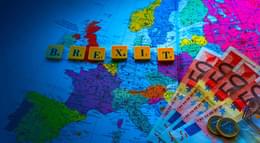
Leave Now and Give Us Certainty!
The May administration has come to be characterised by reaction, contradiction, incompetence and the unknown. Rather than fanning the flames of uncertainty she needs to offer guidance and leadership. If not, the best route ahead is to withdraw from the EU immediately, then negotiate from a position of sovereignty, says Bruce Newsome.
More than 18 months since the Brexit referendum, Theresa May's government is making everybody more uncertain. She took over in July 2016 promising to get on with the separation from the EU and to reduce uncertainty. She has achieved neither. By repeatedly postponing any effective separation and procrastinating on any specifications of what she wants after separation, she is promoting more uncertainty, and increasing the chance of failed negotiations and a failed government.
The problem starts with the government's leadership: both the prime minister and the chancellor campaigned for Remain. The prime minister keeps saying that she is determined to deliver the will of the people but never specifies what else she aims to deliver, and keeps refusing to say whether she would vote for Brexit in a second referendum.
The chancellor (Philip Hammond) spent a second week speaking on the record in favour of "very modest" changes to Britain's relationship with the EU, the "smaller…the better," and a "middle way" between remain and leave, which he mischaracterized as autarkic and isolationist. This makes him the barmiest Brexit-basher of the week, and he's the second most powerful person in a government that promises Brexit. Think about that: this is a government that promises "Brexit means Brexit" but also a "middle way".
These comments just create more uncertainty for everyone. His comments infuriate Brexiteers particularly, whom the Chancellor contradictorily asked to "stick with the Prime Minister. She is doing this in a very careful and methodical way."
The phrase "careful and methodical" sounds like positive spin for "ambiguous and indecisive." Spin undermines confidence in what the government says. Talking about a "middle way" satisfies neither side, increasing uncertainty for everyone.
A new poll shows that an increasingly large majority of voters want a referendum on the final deal, even though the split on whether to leave or remain has not shifted practically. The increase comes from both Brexiteers and Remainers, proving that both sides are more uncertain about which side the government will favour. Think about that: this government clarifies neither side.
From 2016 into 2017, May procrastinated on when to file for separation, then agreed to a date of March 2019, except this won't be the date of separation, because she unnecessarily insisted on a "transition period," in which Britain loses its participation in EU decision-making but retains all its obligations. She claimed this reduces economic uncertainty because Britain will retain access to the customs union during this period, but it only extends the period of uncertainty about what to prepare for after the end of the transition. The new poll proves this: it shows increasing concern about the final deal's impact on the economy and the "British way of life."
The "transition period" also extends the accumulation of grievances against the EU, and the opportunities for the EU to secure more concessions, that just agitate the Brexiteers who were calmed by the referendum in 2016. For instance, in the 18 months through December 2017, the EU passed 102 new laws; Britain voted against 17 of them, but is now subject to all.
In all this time, May made one speech dedicated to Brexit (September 2017) and chaired only one Cabinet meeting on Brexit (December 2017). Meanwhile, the EU sniped at Britain's indecision, urged reconsideration, and demanded outrageous terms that the government kept conceding in principle, such as a payment to correct the EU's own financial mismanagement beyond Britain's legal obligations. Not surprisingly, a poll in November 2017 showed that three times as many Britons agreed than disagreed that the EU is winning the negotiations.
In December 2017, May signed a last-minute, pre-dawn, poorly-worded deal with the EU just to permit further talks on the separation; she did not specify even the price of Britain's "divorce payment", even though she agreed to pay it.
That agreement contained also a pledge to honour the European rights of immigrants from the EU during the entire transition period, which, predictably, encourages increased immigration, in order to secure rights of residency before the final separation. Theresa May obfuscated this fact at the time, and muzzled her few Brexiteers in Cabinet, but her chief negotiator (David Davis) has now admitted the obvious – that unlimited EU immigration will surge throughout the transition period, without Britain's control. Meanwhile, in January 2018 she signed a bilateral deal with France, agreeing to take more migrants that are France's responsibility under international law, and to pay France to improve its border at Calais, which predictably encouraged a surge of new arrivals within the following week, and consternation from Brexiteers.
That news arrived before a leak revealed that British officials were secretly negotiating with the EU for an even longer transition period, beyond two years to almost three years, i.e., to 2022. That would be pushing up against the last date allowable for the next general election – in May 2022.
Yet her premiership cannot possibly survive that long: in foreign policy she looks as naïve and open to exploitation as Neville Chamberlain; at home, she is "one well-aimed speech" away from a vote of no confidence.
She still hasn't specified the trade deal she wants – the EU has given her a month to come up with something. Yet she has now abandoned plans to give a speech about what she wants at the end of Brexit, blaming splits in the Cabinet.
Theresa May's solution to opposition is always to postpone decision-making, stoking more uncertainty, just to give her more time to hang on to her premiership. Like Neville Chamberlain, she puts ego before country.
Theresa May needs to make way for a premier who agrees with Brexit, puts country before self, has direction, and aims to reduce uncertainty.
Given the awful mess of under-specified and downright contradictory agreements, commitments, obligations, and promises that May's government has made, the shortest route to certainty is to withdraw from the EU immediately, then negotiate from a position of sovereignty.















